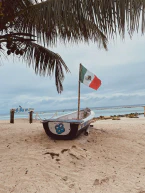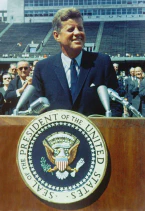Journey of Overcoming

Growing up with a strong role model
The environment in which we grow up can shape our perspectives, values, and attitudes towards life. The speaker’s mother, a strong black woman, instilled a sense of pride and strength in her children from a young age. The speaker describes a wall in their small apartment on the South Side of Chicago that showcased two pictures. One was a larger-than-life photo of the siblings, and the other was a picture of their mother at the age of 12, standing next to Dr. Martin Luther King Jr. The speaker would often stand on their tippy-toes, gaze up at the picture, and pretend to be staring into the eyes of the man who transformed the Civil Rights Movement.
The speaker explains that, as a child, they did not fully understand the significance of the moment captured in that picture. It wasn’t until much later that they realized that Dr. King did not lead the revolution alone; he was surrounded by a movement of anonymous extraordinaries who worked selflessly and vigorously for what they believed in, motivated by conviction and not recognition. The speaker’s mother served as an excellent example of this spirit, which motivated her children to possess the same sense of pride and strength.
The impact of a single photo on a young Natalie’s perspective
As a child, Natalie saw a photo of her grandfather, who was a Holocaust survivor. In the photo, he was standing tall and proud, surrounded by his family. This image had a profound impact on her, as it showed her that even in the face of extreme adversity, her family was able to persevere and thrive. This experience instilled a sense of toughness and strength in Natalie, which would serve her well throughout her life.
The photo also gave Natalie a sense of perspective, as she realized that her own struggles were small in comparison to what her family had endured. This realization helped her to become more empathetic and understanding towards others who were facing difficult situations. Overall, this single photo had a lasting impact on Natalie’s life and helped to shape the person she is today.
Meeting Dr. Vincent Harding and the realization that there were anonymous extraordinaries in the Civil Rights Movement
During her studies at Spelman College, Natalie was introduced to Dr. Vincent Harding, a civil rights activist who worked alongside Martin Luther King Jr. This meeting was a turning point for Natalie, as Dr. Harding emphasized the importance of “anonymous extraordinaries” in the civil rights movement, people who worked tirelessly behind the scenes and didn’t receive recognition for their contributions. This realization helped Natalie understand that there were many unsung heroes in history whose stories were not being told. Dr. Harding’s words inspired Natalie to tell the stories of these individuals and bring their contributions to light.
Struggles with identity and racism in high school
During her high school years, Natalie experienced racism and struggled with her own identity. She attended a predominantly white school where she was often the only Black student in her classes. This led to feelings of isolation and inadequacy. She recalls an incident where a teacher suggested that she was not capable of taking a higher level class, simply because of her race. Despite these challenges, Natalie persevered and went on to graduate at the top of her class. Her experiences in high school shaped her outlook on life and motivated her to advocate for racial equality.
The impact of watching “Invisible Children” and the urgency to take action.
As a college student, Natalie watched a documentary called “Invisible Children,” which shed light on the atrocities committed by Joseph Kony and the Lord’s Resistance Army in Uganda. The documentary made a profound impact on her and she felt a sense of urgency to take action. She co-founded an organization called “Student Coalition Against Labor Exploitation” and worked tirelessly to raise awareness about labor exploitation in the fashion industry. Through her work, she learned about the interconnectedness of issues and the importance of taking action to make a positive difference in the world.
Planning the Rescue of Joseph Kony’s Child Soldiers event and the challenges faced
In this part of the video, the speaker talks about how she and her friends were inspired to take action after watching the documentary “Invisible Children” and learning about the atrocities committed by Joseph Kony’s Lord’s Resistance Army (LRA) in Uganda. They organized an event called “Rescue of Joseph Kony’s Child Soldiers” to raise awareness and funds for the cause.
However, organizing the event was not easy. They faced challenges such as finding a venue, getting sponsors, and dealing with negative feedback from people who criticized their efforts. Despite the obstacles, they persevered and managed to host a successful event that raised thousands of dollars for the cause.
The speaker emphasizes the importance of taking action and not being deterred by setbacks, highlighting that small steps can lead to meaningful change.
The importance of the bill to end Africa’s longest-running war
During the early 2000s, a war in Northern Uganda had been raging for over two decades, leading to the abduction of thousands of children who were forced to serve as soldiers. In response to this conflict, a bill was introduced in the United States Congress with the aim of ending the war and bringing the perpetrators to justice.
The speaker in the video emphasizes the importance of this bill, stating that it was the result of years of advocacy and activism by a wide range of individuals and organizations. She notes that it was a difficult process to get the bill passed, as it required the cooperation of many different actors and faced significant opposition from those who were skeptical of its effectiveness.
Despite these challenges, the bill ultimately passed and played a significant role in ending the conflict in Northern Uganda. The speaker highlights the importance of persistence and determination in achieving this outcome, as well as the power of collective action to bring about change on a global scale.
The power of anonymous extraordinaries and the small acts that make us extraordinary
In this part of the video, the speaker reflects on the power of anonymous extraordinaries, ordinary people who make a positive difference in the world without seeking recognition or fame. The speaker shares that it was the countless anonymous extraordinaries who supported and contributed to the rescue event that made it a success.
The speaker emphasizes that everyone has the ability to be extraordinary by doing small acts of kindness and making a positive impact on others. The speaker encourages viewers to look for opportunities to make a difference in their own communities and to remember that even small actions can have a big impact.
Conclusion
The journey of anonymous extraordinaries like Natalie Warne is truly inspiring. Her story teaches us that it doesn’t matter who we are, where we come from, or how old we are; we all have the power to make a difference in this world. It all starts with a strong sense of self, a belief in our abilities, and the willingness to take action.
Natalie’s upbringing, the impact of a single photo, meeting Dr. Vincent Harding, struggles with identity and racism in high school, watching “Invisible Children,” planning the Rescue of Joseph Kony’s Child Soldiers event, the importance of the bill to end Africa’s longest-running war, and the power of anonymous extraordinaries are all significant events in her life that shaped her into the person she is today.
Her story shows us that small actions can lead to big changes, and sometimes it only takes one person to make a difference. We can all be anonymous extraordinaries by standing up for what we believe in, using our voice to make a difference, and taking action when we see an opportunity to help others.
Natalie’s story is a testament to the fact that we are all capable of making a positive impact in the world. It’s up to us to use our unique talents and abilities to make a difference and be the change we wish to see in the world. Let’s all take inspiration from Natalie’s journey and strive to be the anonymous extraordinaries that we all have the potential to be.







